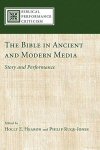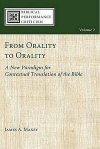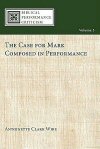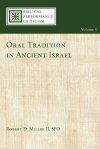Biblical Performance Criticism Series (4 vols.)
Digital Logos Edition
Overview
When it comes to studying the Bible, many readers don’t realize that ancient societies during Bible times were mostly oral. If the Bible is viewed in light of its oral and scribal traditions—instead of the mentality that it was a print culture—new academic discoveries can be made in the area of ancient performance of biblical traditions. This includes orality, memory, translation, rhetoric, and discourse. More importantly, biblical writings can be reinterpreted with better accuracy.
The Biblical Performance Criticism Series includes four volumes on the interplay of oral and written composition and performance throughout history. It analyzes the contributions Thomas Boomershine has brought to oral history and media studies. This collection also focuses on the renewed interest in oral performance in light of Bible translation to oral cultures—specifically the Vuté people of Cameroon. The last two remaining volumes focus on the oral tradition in Israel and discuss which Bible books were most likely orally derived. The Biblical Performance Criticism Series (4 vols.) is perfect for pastors, students, and scholars seeking a comprehensive study of oral tradition and performance.
The four volumes of the Biblical Performance Criticism Series are great additions to your electronic library if you’re wanting to learn more about oral tradition and performance. In the Logos edition, this subject is easily searchable and more convenient than ever before, with Scripture references linked directly to your favorite Bible translation and cross references linked to other resources in your digital library.

Key Features
- Comprehensive study on oral tradition and performance in ancient and modern cultures
- Contributions from numerous scholars
- Thorough introductions, bibliographies, and indexes
Product Details
- Title: Biblical Performance Criticism Series
- Publisher: Wipf and Stock
- Volumes: 4
- Pages: 842
Individual Titles

This cutting-edge volume has been brought together in honor of Thomas Boomershine, author, scholar, storyteller, and innovator. The particular occasion inviting this recognition of his work is the twenty-fifth anniversary of the Society of Biblical Literature’s section on The Bible in Ancient and Modern Media (BAMM), which Tom was instrumental in founding. For two and half decades this program unit has provided scholars with opportunities to explore and experience biblical material in media other than silent print, including both oral and multimedia electronic performances. This book explores many, though by no means all, of the issues lifted up in those sessions over the years.
Holly E. Hearon is associate professor of New Testament at Christian Theological Seminary in Indianapolis. She is the author of The Mary Magdalene Tradition: Witness and Counter-Witness in Early Christian Communities.
Philip Ruge-Jones is associate professor of Theology at Texas Lutheran University in Seguin, TX. He is the author of The Word of the Cross in a World of Glory and Cross in Tensions: Luther’s Theology of the Cross as Theologico-Social Critique.

From Orality to Orality: A New Paradigm for Contextual Translation of the Bible
- Author: James A. Maxey
- Series: Biblical Performance Criticism
- Publisher: Wipf and Stock
- Publication Date: 2009
- Pages: 234
In this groundbreaking work, Bible translation is presented as an expression of contextualization that explores the neglected riches of the verbal arts in the New Testament. Going beyond a historical study of media in antiquity, this book explores a renewed interest in oral performance that informs methods and goals of Bible translation today. Such exploration is concretized in the New Testament translation work in central Africa among the Vuté people of Cameroon.
This study of contextualization appreciates the agency of local communities—particularly in Africa—who seek to express their Christian faith in response to anthropological pauperization. An extended analysis of African theologians demonstrates the ultimate goals of contextualization: liberation and identity.
Oral performance exploits all the senses in experiencing communication while performer, text, and audience negotiate meaning. Performance not only expresses but also shapes identity as communities express their faith in varied contexts. This book contends that the New Testament compositions were initially performed and not restricted to individualized, silent reading. This understanding encourages a reexamination of how Bible translation can be done. Performance is not a product but a process that infuses biblical studies with new insights, methods, and expressions.
What does ‘orality’ and public performance have to do with translating the written Scriptures of God? Many misconceptions about the nature of the biblical texts and their communication in modern world languages are corrected in this thoroughly engaging, wide-ranging book that offers an innovative, multidisciplinary approach to the subject. I can heartily recommend James Maxey’s pioneering work on contextualizing the New Testament for effective contemporary, multi-sensory re-presentation. This is a vital resource for all students, exegetes, commentators, teachers, translators, and other communicators of the Word.
—Ernst R. Wendland, instructor, Lusaka Lutheran Seminary
In this volume, which brings together studies on Bible translation, orality, and performance criticism, James Maxey leads us into new and exciting ways of thinking about and doing Bible translation that takes into serious consideration the local context of the translation. The specific reference to the New Testament translation in Cameroon takes the reader from theory to actual practice and shows the exciting future of Bible translation for performance.
—Roger L. Omanson, translation consultant, United Bible Societies
Discarding simplistic communication models and insisting on the role of receptor community in the construction of meaning, James Maxey’s From Orality to Orality deploys a strategic array of tools (orality studies, postcolonial critique, performance criticism, contextual case studies) that allows development towards a (contextual) ‘missiology of Bible translation’ and aids in the much needed redefinition of Bible translation as a power activity. In this way, Dr. Maxey also contributes significantly to the relocation of Bible translation within the broader context of translation studies.
—Philip H. Towner, dean, The Nida Institute for Biblical Scholarship
James A. Maxey is director of Program Ministries for Lutheran Bible Translators in Aurora, Illinois.

The Case for Mark Composed in Performance
- Author: Antoinette Clark Wire
- Series: Biblical Performance Criticism
- Publisher: Wipf and Stock
- Publication Date: 2011
- Pages: 238
Is it possible to make a case that the Gospel of Mark was not composed by a single man from scattered accounts but in a process of people’s telling Jesus’ story over several decades? And what can we say about the tellers who were shaping this story for changing audiences?
After an introduction showing the groundwork already laid in oral tradition research, the case begins by tracing the Mark we know back to several quite different early manuscripts which continue the flexibility of their oral ancestors. The focus then turns to three aspects of Mark, its language, which is characterized as speech with special phrases and rhythms, its episodes characterized by traditional forms, and its overall story pattern that is common in oral reports of the time.
Finally, several soundings are taken in Mark to test the thesis of performance composition, two scenarios are projected of possible early tellers of this tradition, and a conclusion summarizes major findings in the case. Mark’s writer turns out to be the one who transcribes the tradition, probably adhering closely to it in order to legitimate the new medium of writing.
This is a remarkable book. Just what we have been waiting for to help us understand Mark not only as an exciting story but also as an enlivening performance of the good news. Wire pulls together the challenging breakthroughs of recent research on various fronts that are forcing us to rethink some of the most basic assumptions of the modern study of Scripture. She ingeniously organizes her discussion around the objections often raised by those embedded in ‘print-culture’ who can’t imagine that the Gospel of Mark could have been composed in oral performance. She patiently and clearly leads skeptical modern students and scholars step by step into the ancient world of oral communications where stories developed in the telling and retelling.
—Richard Horsley, professor of New Testament, University of Massachusetts in Boston
In this exquisitely argued book, Anne Wire pulls together recent research on the oral and aural dimensions of written texts to present a compelling case for the composition of the Gospel of Mark in performance. Rarely does one have the pleasure of reading a book that presents its argument with such precision, clarity, and elegance. The paradigm shift that many have been calling for is here beautifully launched and can no longer be ignored.
—Holly E. Hearon, professor of New Testament, Christian Theological Seminary
Wire’s book is a must-read for all interested in the Gospel of Mark. It convincingly makes the case that Mark is orally composed tradition told by several storytellers over time—not the product of a single author. The book systematically reviews and refutes the various arguments that Mark was a written composition and not oral traditional literature, demonstrating that in fact oral composition over time is a better explanation for the Gospel’s origin. She also shows what a difference this makes for interpreting Mark. This book should have a major impact on Markan studies for students and scholars alike.
—Joanna Dewey, Harvey H. Guthrie Jr. Professor Emerita of Biblical Studies, Episcopal Divinity School
Antoinette Clark Wire is Robert S. Dollar Professor of New Testament at San Francisco Theological Seminary where she has taught since 1973. Dr. Wire is a graduate of Yale Divinity and Claremont Graduate School. Raised in China by missionary parents, she has lived her adult life largely in California. Her most recent book is Holy Lives, Holy Deaths: A Close Hearing of Early Jewish Storytellers.

Providing a comprehensive study of “oral tradition” in Israel, this volume unpacks the nature of oral tradition, the form it would have taken in ancient Israel, and the remains of it in the narrative books of the Hebrew Bible. The author presents cases of oral/written interaction that provide the best ethnographic analogies for ancient Israel and insights from these suggest a model of transmission in oral-written societies valid for ancient Israel. Miller reconstructs what ancient Israelite oral literature would have been and considers criteria for identifying orally derived material in the narrative books of the Old Testament, marking several passages as highly probable oral derivations. Using ethnographic data and ancient Near Eastern examples, he proposes performance settings for this material. The epilogue treats the contentious topic of historicity and shows that orally derived texts are not more historically reliable than other texts in the Bible.
In this book, Robert Miller offers an assessment of the modern study of oral tradition in ancient Israelite literature. . . . The result is an engaging survey of the question of oral literature in ancient Israel. The book points up the problems and prospects involved in this most difficult area of biblical studies.
—Mark S. Smith, Skirball Professor of Bible and Ancient Near Eastern Studies, New York University
Robert Miller’s Oral Tradition in Ancient Israel is warmly to be welcomed. Miller is particularly well equipped for this task, being equally at home in literary and archaeological work, and this timely and comprehensive study does not disappoint. Miller succeeds brilliantly in demonstrating that there was an interplay of oral and written composition and performance throughout Israel’s history. We are very much in his debt.
—Paul M. Joyce, Theology Faculty Board Chairman, University of Oxford
This study is a fascinating contribution to discussion of the role of oral tradition in the composition of biblical texts. Miller offers an impressive critique of classic and recent studies on the oral-written continuum in a wide range of literatures and cultures, opening up new insights into the literature and culture of the Hebrew Bible.
—Katherine Hayes, professor of Old Testament, Seminary of the Immaculate Conception
Robert D. Miller II is associate professor of Old Testament at the Catholic University of America in Washington, DC. He is the author of Chieftains of the Highland Clans and Syriac and Antiochian Exegesis and Biblical Theology for the 3rd Millennium.
This title is included in the following collections
You can save when you purchase this product as part of a collection.
2025 Charismatic Portfolio
$4,749.99$4,749.99Wipf and Stock Ultimate Collec...
$11,593.84$8,499.992025 Ultimate Library
$23,999.99$23,999.99